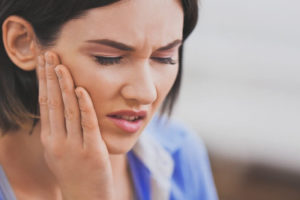Do you have a sweet tooth, but cringe in pain every time you enjoy a sweet treat? If you have teeth sensitive to sugar, you may wonder if there’s any way to get relief.
If this happens to you it likely means that the enamel of your teeth is damaged, and is making your teeth sensitive to sweets and other foods. Fortunately, for those whose teeth are sensitive to sugar, there are solutions to help you enjoy your favorite foods and avoid discomfort.

Causes of Teeth Sensitivity to Sugar
While we often hear about sensitive teeth being caused by extreme temperatures, there are other things that can trigger teeth sensitivity as well. Many people suffer from teeth sensitive to sweet foods.
Tooth sensitivity, regardless of the cause, can result from the loss of enamel on your teeth. There are many causes for why teeth are sensitive to sugar, but common causes include brushing too hard or enjoying too many highly acidic foods. Both of these activities cause damage to the enamel of your teeth and can expose the sensitive inner layer of your teeth. Once the outer layer of enamel is damaged, sugary foods, hot or cold beverages, or other irritants have easier access to the nerve center of your teeth, which can cause sharp pain.
Preventing Teeth Sensitivity to Sugar
For those with a serious sweet tooth who can’t imagine having to experience painful teeth that are sensitive to sweets while indulging in soda, candy, or sweets, there are steps you can take to prevent this discomfort.
Since teeth sensitivity can be caused by damaged enamel, your best bet is to protect your enamel by taking proper care of your teeth. While many people brush every day, you can’t count on this alone to protect your precious enamel. Here are some tips to help protect against painful teeth sensitivity:
- Use a Soft-Bristled Toothbrush: Finding a toothbrush that is delicate enough to help you avoid tooth sensitivity is also a great idea. One of the best recommendations is the Oral-B Sensi-Soft Manual Toothbrush, which is extra soft and gentle on sensitive teeth.
- Use a Toothpaste Designed to Protect against Teeth Sensitivity: Toothpastes that feature the active ingredient stannous fluoride are designed to protect against teeth sensitivity. Try Crest Pro-Health Sensitive + Enamel Shield Toothpaste. It features the active ingredient stannous fluoride, which is clinically proven to protect teeth from sensitivity. By protecting your teeth from sensitivity, you can enjoy the foods you love and experience less painful sensitivity. All Crest Pro-Health toothpastes are triclosan-free.
- Don’t Brush Too Hard: Brushing too vigorously can cause serious damage to your enamel and can lead to teeth sensitive to sweets. In fact, one-third of 700 dentists surveyed by the Academy of General Dentistry say the second-leading cause of teeth sensitivity is poor toothbrushing technique.
Dentin Hypersensitivity: Unraveling the Mystery
Dentin Hypersensitivity (or Sensitive Dentin) is a dental condition where the teeth are sensitive and feel a sharp pain in response to certain tastes. In some cases, it can be when the teeth ache from hot foods or cold foods, or, in other cases, sweet foods. Oftentimes, the pain causes extreme discomfort, albeit only for a short duration, usually ending as quickly as it starts. While dentin is usually somewhat sensitive, the pain is abnormal. There are several factors which can lead to Dentin Hypersensitivity. It could be something as simple as brushing incorrectly or perhaps something more complex, like a poor diet.
Incorrect Brushing
If you don’t know the correct way to brush, then you’re not alone. Many people practice incorrect brushing habits. One of the more common mistakes people make is not changing out their brush enough times. To prevent it from causing any damage to your teeth, a toothbrush needs to be replaced after three or four months. Another mistake people make is brushing their teeth with a hard bristle brush.
Mouth Trauma
It’s not difficult for your mouth to suffer from trauma, with afflictions such as chipped teeth or even fractured teeth. Both of these can be responsible for your Dentin Hypersensitivity. If your teeth suffer any trauma, have them examined as soon as possible by a local dentist. If you’ve recently had a root surface polished, then this could also be the reason why you have sensitive teeth.
Poor Diet or Poor Eating Habits
A poor diet or poor eating habits can be a major factor in a case of Dentin Hypersensitivity. Everyone at some point has been told they need to get their daily dose of vitamins, but did you know that vitamin intake can affect your teeth? For instance, Vitamin C is a large factor in Dentin Hypersensitivity prevention, and needed for oral health in general. Without the right amount of Vitamin C, you could suffer from several oral health problems, like tooth decay or (in particularly bad cases) scurvy.
What is Sugar Sensitivity?

One in every eight Americans has sensitive teeth, and the condition is more popular among children and adults. Tooth sensitivity can happen at any stage of your life, regardless of your eating habits. Those who are specifically sensitive to sugar are called sugar sensitive. It is a dental problem where you don’t have cavities, but you still feel sharp, tingling, or stabbing pain when you have sugary stuff.
6 Causes of Sugar Sensitivity
In a normal state, teeth don’t hurt when eating sugary foods. However, if you experience the opposite, there must be some underlying health issue that you should be aware of. Here we have listed some possible causes of sugar sensitivity.
- Worn down Enamel
Enamel is a hard protective layer on your teeth that protects them from physical, chemical, and thermal damage. If this weren’t for enamel, you would be unable to eat or drink cold and hot food items. Since enamel also protects your teeth from decaying and getting cavities, your teeth start to erode if it wears down, increasing the chances of tooth decay.
- Damaged Tooth
A damaged tooth due to any trauma or an accident can cause a sensitive tooth. If you ever got caught in an accident and got your teeth damaged or hurt your teeth while playing sports or running, you may experience sugar sensitivity. Also, sometimes when you get your root surface polished, you experience sensitivity.
- Bruxism
Bruxism, commonly called teeth grinding, is a condition or a coping mechanism of your body to stress. The person with this condition grinds their teeth in their sleep, which makes them weak or even damaged in severe cases. So yeah, if you have a habit of teeth grinding, there are high chances that you have sugar sensitivity.
- Teeth Whitening Treatments
As promising as they sound, teeth whitening treatments have their own bunch of side effects. They may give you that pearl-white shine you desire, but eventually, they will make your teeth sensitive. Especially laser teeth whitening is known for causing sensitivity due to the use of hydrogen peroxide in the procedure. That said, the teeth sensitivity caused by these treatments fades away on its own.
- Gum Disease
Gum recession and sensitive teeth are two major symptoms of gum disease. People who suffer from gum disease have infections in their gums which causes their teeth to become sensitive. Especially, in the case of gingivitis and periodontitis, you feel severe sugar sensitivity and bad gums.
- Bad Eating Habits
Well, this one is quite evident. Eating acidic and sugary foods can badly affect your oral health. When you have bad oral hygiene and you consume sugars and acids in large amounts, bacteria begin to munch on those leftovers, and as a result, it causes plaque buildup and bad teeth. Teeth sensitivity is the initial stage of your oral recession, eventually leading to tooth loss or gum diseases.
5 Ways to Treat Sugar Sensitive Teeth
Fortunately, we live in an era with a solution to every problem. Sugar sensitivity can be treated without going to a dentist by maintaining good oral hygiene. Following, we have suggested some ways to deal with sugar-sensitive teeth.
- Limit your Sugar intake
Of course, this has to be the number one priority. Even though the damage has already been done, you can still manage it by limiting your sugar intake. Also, by limiting sugar, we don’t just avoid candies but anything that has large amounts of sugar in it, for instance, cereals, salad dressings, fruit juices, artificial sweeteners, soups, etc. too much sugar not just causes sensitivity in teeth but impacts your overall health. Therefore, completely cutting down on sugar would be ideal.
- Avoid Acidic Foods
As we mentioned previously, acids are quite harmful to your dental health. They initially cause sensitivity and later lead to dental erosion. You must avoid acidic foods during this condition, including lemon, pickles, carbonated drinks, honey, yogurt, ice cream, cocktails, and wines.
- Improve your Brushing Habits
Changing poor brushing habits will help tons to cure sugar-sensitive teeth. First, change your toothbrush if you use a hard bristle one, and don’t scrub your teeth as you file your nails. Exerting too much pressure on your teeth and scrubbing with a hard bristle brush damage your enamel and leave your teeth unprotected from external threats.
- Use Desensitizing Toothpaste
Several desensitizing toothpastes come on the market to block the pain and give you relief from pain. You can either check online directly or consult your dentist to find a good desensitizing toothpaste. Also, dentists suggest using a fluoride toothpaste for regular brushing to strengthen your enamel and protect your teeth from further damage.
- Avoid at-home Whitening Treatments
While this may not be true for all whitening kits, some at-home teeth whitening treatments cause damage to your teeth. What it does is it weakens your enamel to get you a clear layer on the top while compromising your upper protective layer. Treatments that contain bleach and hydrogen peroxide must be strictly avoided.
Why Do My Teeth Hurt When I Eat Something Sugary?
Whether it’s sweets or a sugary dessert, when you have sugar sensitivity, your teeth hurt regardless of the form of sugar you take. Therefore, as we suggested above, avoid having sweets, chewy candies, cereals, ice creams, etc., that directly impact your teeth. Also, sugar sensitivity doesn’t always mean that you have cavities. It also happens when you have weak dental enamel.
Conclusion
We have witnessed several cases where patients have no cavities but teeth hurt when eating sweets. We always recommend changing their brushing habits and toothpaste as an immediate course of action. Once they hop on the path of maintaining oral hygiene, they can include the other prevention methods we have listed above. However, if they feel the pain is unbearable, they need to consult a dentist on an urgent basis.

